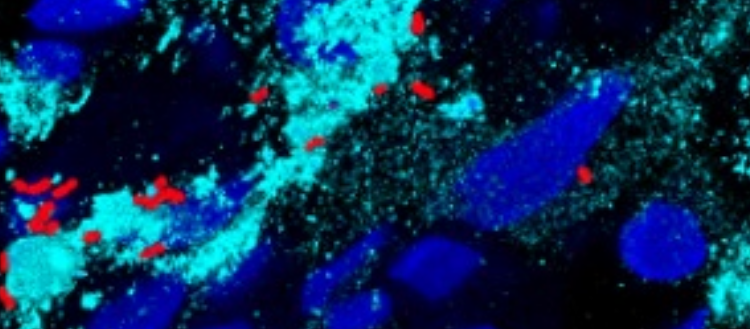Cystic fibrosis: limiting the harmful adhesion of bacteria
Biologists from the UNIGE Faculty of Medicine have discovered pharmacological inhibitors that limit the development of bacterial infections in the cells of people with cystic fibrosis. These results can be read in JCI Insight.

Bacteria (in red) adhere to docking terminals (in turquoise) formed on the surface of respiratory cells with cystic fibrosis (in blue). Prof. Chanson's laboratory - UNIGE
Cystic fibrosis, one of the most frequent genetic diseases in Switzerland, causes severe respiratory disorders. Despite considerable therapeutic advances, this disease still reduces the life expectancy of patients, due in particular to chronic and sometimes fatal bacterial infections. In 2020, Professor Marc Chanson's team at the Department of Cell Physiology and Metabolism and the Centre for Inflammation Research at the University of Geneva (UNIGE) Faculty of Medicine discovered the reason for this large number of lung infections: a protein called Vav3 is thought to promote these infections by creating "bacterial docking stations" on the surface of patients' airways. Pathogenic bacteria, including Pseudomonas aeruginosa, a bacterium that is resistant to many antibiotics, are able to attach themselves to the surface of the respiratory tract and cause repeated infections.
How to prevent the building of these docking stations?
In order to evaluate the possibility of using this mechanism for therapeutic purposes, Marc Chanson's team sought to understand the underlying molecular mechanisms. The scientists identified a new protein, called HuR, which is over-expressed in people with cystic fibrosis. In overabundance, the HuR protein stabilises the RNA code responsible for the production of the Vav3 protein, causing its accumulation, and consequently the formation of docking terminals allowing bacteria to trigger severe respiratory infections.
Inhibiting HuR without damaging the cell
To confirm their discovery, the UNIGE biologists inhibited the HuR protein in cystic fibrosis cells in several different ways. Inhibition of HuR, including two pharmacological inhibitors, prevented the formation of docking terminals and limited bacterial adhesion, without causing cell toxicity or inflammation. Although further investigations are still needed, this study opens up new possibilities for preventing respiratory infections in people with cystic fibrosis. Read more about the results in the journal JCI Insight.
